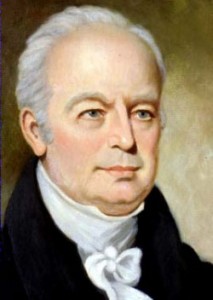Related Topics
..Constitution and Court
Forget all those lawyer jokes you hear. The American legal profession can rightly be proud of the Federal Court System, an achievement of the whole profession. America may be legalistic and overlawyered, but that reflects the rule of law dominated by lawyers. Curiously, the leader of this creation, John Marshall, was not so much a legal theoretician as a relentless Federalist lawyer, determined to reshape the legal profession to be worthy of power.
John Rutledge and Judicial Powers

|
| John Rutledge |
The perfectionists at the Constitutional Convention took so much time establishing a careful foundation, that by the time it was necessary to adjourn, several vital matters had to be completed in haste. For example, designing the election of the President was a notorious casualty of careless drafting, and the election of 1800 was to be its near-tragic outcome. It proved necessary to pass the Twelfth Amendment to get things even approximately right. If Rutledge and his committee had not bullied ahead with a long list of tedious details during the July 4, 1787 recess, the hastiness of the Convention's September adjournment might have left many other matters in a similarly impossible jumble. Apparently, Rutledge, a lawyer graduated from the London Inns of Court, had sat by in fuming frustration as one essential matter after another was dumped on his "Committee of Postponed Parts". While the other delegates finally took a much-needed breather at the July 4 recess, Rutledge convened his committee and pushed through a considerable amount of the "boilerplate" which any good lawyer could see was essential, but the dominant soldiers and politicians of the Convention were afraid to decide. As matters turned out, Rutledge had it mostly right, and many of his points were never even voted upon. Unfortunately, when he later tried to do the same thing a second time, he slipped in some egregiously pro-slavery provisions, and the politicians slapped him down. Nevertheless, the proposed Constitution emerged with only a forgivable number of errors, an adequate legal system, and a framework on which John Marshall was later able to build a really outstanding judicial system. To some extent, the Delegates appeared to recognize they were covering up for the inadequacies of James Madison. Not much was made of it in public, but after the adoption of most of the Virginia Plan, and the great compromises of Franklin and Dickinson, Madison won very few of the motions he proposed during the last two months of the Convention. Prior to that time, just about everything he proposed had been adopted. He could not have enjoyed the contrast, very much.
Scholars have declared that the fatal flaw of the Articles of Confederation was that they forced the national government to operate through the intervening agency of the states, whereas the Constitution had a direct connection between "We, the people" and the national government. Nowhere was that truer than in the operation of federal taxes directly on the people, but it was just as significantly true of the Federal Courts. In the case of a vast number of other matters, skipping the involvement of state government may create some efficiency, but that gain is insignificant compared with the loss of sensitivity to local variations. There are indeed times when a national navy or patent system does things which individuals could not possibly do for themselves, but a vastly greater number of other times when personal choice and personal responsibility lead to a better result. It is indeed more efficient in the vast middle ground, to skip the overhead of deciding what is generally best for the whole country, and what to do about countless exceptions. In the case of the federal courts, however, the issues have been pre-selected and enumerated as too broad to leave to state variation. Therefore disputes about them are selectively worth more time and effort to find the right resolution. Seemingly unrelated matters all begin to fall together, which is often a sure sign of using the right approach. Generally speaking, however, there was nothing particularly clever or innovative about Rutledge's work on the Judicial parts of the Constitution. He just got it done.
Originally published: Thursday, August 02, 2012; most-recently modified: Wednesday, May 22, 2019